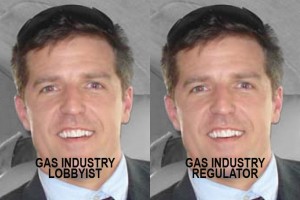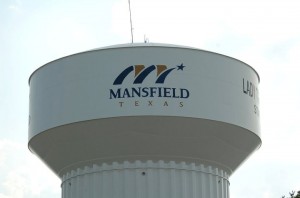Posts Tagged ‘Mansfield’
“I’m on Both Sides of It.” Mansfield City Councilman Stephen Lindsey Has the Worst Conflict of Interest in the Barnett Shale
 Stephen Linsdey is an entrenched member of the oil and gas industry. In the mid-Oughts he worked for Flowserv, the multinational manufacturer of valves and pumps used at thousands of oil and gas facilities worldwide. From 2007 to 2008 he was put in charge of protecting and developing Iraqi oil fields during the Iraq War. Beginning in 2008, just as the local Shale boom was taking off, he went to work for Quicksilver Resources inc, the sixth largest producer in the Fort Worth Basin, where he's been ever since, serving as Senior Director Of Government Relations and Community Affairs.
Stephen Linsdey is an entrenched member of the oil and gas industry. In the mid-Oughts he worked for Flowserv, the multinational manufacturer of valves and pumps used at thousands of oil and gas facilities worldwide. From 2007 to 2008 he was put in charge of protecting and developing Iraqi oil fields during the Iraq War. Beginning in 2008, just as the local Shale boom was taking off, he went to work for Quicksilver Resources inc, the sixth largest producer in the Fort Worth Basin, where he's been ever since, serving as Senior Director Of Government Relations and Community Affairs.
According to the company's job description, Lindsey's responsibilities "include community relations, municipal/city engagement, governmental/legislative affairs, regulatory/permitting, external affairs and corporate/public relations." He's also Treasurer of Quicksilver's Political Action Committee, overseeing the distribution of thousands of campaign contributions to officials such as Arlington Mayor Robert Cluck, Fort Worth Mayor Betsy Price, Railroad Commissioner Barry Smitherman, and Texas House Representative Jim Keffer, Chair of the House Energy Committee.
Lindsey's job is to smooth over any regulatory obstacles in the way of Quicksilver's production goals. He's the company's lead negotiator with local and state governments. He also is in great demand on the oil and gas industry speaker circuit as an expert on how to deal with what he says are those "working against industry's interest."
In his own words, "My role in my organization is to make insure the guys that want to drill wells and complete wells, and run pipelines, and put in surface equipment, and move trucks can do it uninhibited. Can do it without fear their permits are gonna get denied, or the regulatory structure is going to come down on them."
That's his day job. But Stephen Lindsey is also a Mansfield City Council member. In fact, as coincidence would have it, he's the city council member the Mayor has put in charge of overseeing the city's gas drilling policies.
And now, he's the city's go-to guy for the re-examination of Mansfield's obsolete 2008 gas drilling ordinance that's been the subject of a steady grassroots campaign of determined residents. You got a problem with that?
As it turns out, Lindsey isn't even the only member of the Mansfield city council who's intimately connected to the oil and gas industry. Larry Broseh is president of a drilling parts manufacturer whose clients include gas patch operators all over the state, including the Barnett Shale. That's two out of the seven city council members who have a pretty big conflict of interest.
But it's not just who Lindsey works for that makes for the outrageous double duty. It's what he does for Quicksilver. He's the slick PR guy that interfaces with local city councils to downplay the hazards of fracking in order to win permits. He's the spokesperson in the media. If Quicksilver had wells in Mansfield (the closest ones are in Arlington), the council would be sitting across the table from Stephan Lindsey. And as a national poster boy for fracking's public relations strategies, he's often the friendly face of the industry across the country. He's certainly fracking's most high profile elected official in the Barnett. And he wants you to know he's sincere about trying to get "the best product" i.e the best conciliatory agreements between industry and government.
With only 60,000 residents, but over 200 wells and another 300 potential ones to come, Mansfield has twice as many wells per capita than Denton and almost a third more per capita than even Fort Worth. Residents there are pressing to replace an industry-blessed "Fort Worth model" 600-foot setback (that's really a 300 setback with variances) with a "Southlake/Dallas model" 1500-foot setback minus any variances. Outside of Denton, now in court over an outright ban on fracking, Mansfield is the next battleground in the Barnett Shale for the clash between these two competing regulatory templates.
Lindsey is well aware of this clash. Part of his job is going around the country warning industry about the growing power of local governments in regulating drilling. He cites Flower Mound and Denton as bad examples. As one industry conference panel moderator posed it to Lindsey, "What's your advice on how to prevent a Denton?"
According to Lindsey, "local governments are increasingly at odds with state government." Cities don't feel as if they're protected by state entities like the Railroad Commission or TCEQ anymore. "Detrimental regulations" by municipal governments are on the rise. When older white Republicans are opposed to you, "that's a sea change."
Much to Lindsey's chagrin, unlike Colorado, where the Attorney General has taken local county governments to court because of this overreach, Texas home rule cities "can do whatever they want." If the cities think it's in their best interests, those regs "are going to stand" unless they're challenged. You can almost taste the anticipation he has over the lawsuits the Denton fracking vote has generated as a chance to settle the score and cut the cities down to size.
In his presentations to industry peers, Lindsey boosts about his role as a Mansfield city council member. "I'm on both sides of it. I'm out lobbying, er, presenting at City of Fort Worth, City of Arlington, City of Haslet, City of Southlake, City of Northlake – all of our operational areas, trying to get our permits approved and on the other hand, I'm sitting on our own city council listening as XTO, and Chesapeake, and other operators come in and present there."
Traditionally, the strictest interpretations of conflict of interest have meant that the elected official or a close relative had to have worked for or owned stock or or percentage in the specific company being discussed. Since Quicksilver doesn't have any wells in Mansfield, Lindsey passes that test. But in terms of a more general conflict over the escalation of local regulation of the gas industry, his positon in Quicksilver and as an industry spokesperson certainly does pose a conflict.
He doesn't hesitate to describe threats to the industry as a whole, or to advise other companies on how to "manage them." No matter how much more protective to public health it might be, wouldn't the spread of a Dallas-like model of "detrimental" regulation of drilling to a place like Mansfield be a bad precedent for the industry as a whole? Wouldn't it constitute a threat to other operators like Quicksilver, whose own future wells might be targeted next in Arlington, or Haslet, or God forbid, even Fort Worth?
If he was being honest, Stephen Lindsey the industry lobbyist would have to say yes. After all, as he noted to a Colorado reporter in an article over a local County's demand for a monitoring water well Quicksilver didn't want to install, "We’ve got to make prudent decisions about what option is best for the company."
In 2010, the City of Fort Worth Ethics Committee ruled that three gas company employees had a conflict of interest in serving on its air quality study committee by concluding, "The level of their loyalty to their employers has put them in a position of wearing two hats."
The same is true of Stephen Lindsey. Mansfield residents shouldn't have to guess which hat Lindsey is wearing when he's working as a city council member, or whether he's putting their well-being or the industry's bottom line first.
(Most of the quotes used in this post come from a presentation for the American Business Confernce in October, avaialble for viewing online: http://vimeopro.com/lbcg/fe14/video/108496562)
First-Ever DFW Physician Presentation on Fracking in Mansfield October 29th
 (Mansfield)— A new group of Mansfield residents is sponsoring what’s believed to be the first DFW presentation by a medical doctor on the health effects of fracking as part of a campaign to re-write the city’s six-year old drilling ordinance they say no longer reflects the best science, or provides enough public protection.
(Mansfield)— A new group of Mansfield residents is sponsoring what’s believed to be the first DFW presentation by a medical doctor on the health effects of fracking as part of a campaign to re-write the city’s six-year old drilling ordinance they say no longer reflects the best science, or provides enough public protection.
Mansfield Gas Well Awareness is hosting Dr. Anne Epstein, M.D. at the Mansfield Holiday Inn on October 29th beginning at 7 pm. Dr. Epstein is an internal medicine specialist who graduated from Baylor Medical School and sits on the Lubbock County Board of Health. She’s a member of the Board’s Oil and Gas Advisory Committee that recently voted to recommend setbacks of 1500 feet separating homes, workplaces, and schools from wells. Mansfield currently allows wells as close as 600 feet to residences, with post drilling development up to 100 feet.
“Our 2008 ordinance was written before new scientific studies showing higher rates of birth defects and cancers among those living close to gas wells,” said Tamera Bounds, a member of MGWA. “Like Lubbock, Dallas and other Texas cities that have looked at those studies recently and adjusted their regulations, Mansfield must update its obsolete rules to better protect our families and property values.”
206 gas wells have been drilled in the city of 60,000 in the last six years with the potential to drill 300 more. That’s almost as many as Denton, with twice the population. Almost every Mansfield resident currently lives within a mile of one well or more. However, the Special Use Permits (SUPs) approved by the city expire after five years. SUPs for undrilled wells approved in 2008 and 2009 have already expired or will soon, and MGWA wants the city to take the opportunity to strengthen its drilling ordinance.
“We want to make sure our rules match the new science by allowing for bigger buffer zones, more air pollution controls and better monitoring and emergency response,” said Bounds. She citied 2008 correspondence from a gas well operator to the Mansfield Planning and Zoning Committee that claimed closer distances between schools and wells, as opposed to nursing homes, were justified because “children are very mobile.”
“We need rules based on more than the industry’s estimate of how fast our children can run.”
Among the recent studies cities by Bounds and scheduled to be reviewed by Dr. Epstein are those from the University of Colorado School of Public Health that trace close proximity to gas wells with higher rates of birth defects, and the National Institute of Occupational Safety and Health that discovered benzene and silica levels among workers at drilling sites that exceeded federal exposure limits.
Bounds’ group is being assisted by DFW clean air group Downwinders at Risk, which was instrumental in getting a new Dallas gas ordinance passed in 2013. Downwinders Director Jim Schermbeck says he thinks the Mansfield effort marks a milestone in Tarrant County’s coping with the Barnett Shale drilling boom. “It’s a great example of residents in a city saturated with wells after the first wave of drilling trying to recover and catch up with the science before the next wave makes things a lot worse.”
Schermbeck cautioned that the Mansfield group had an uphill climb considering its current council make-up.
At least two of Mansfield’s city council members are directly involved in the fracking business. Larry Broseh is the president of Drill King International, a manufacturer of drilling equipment, and Stephen Lindsey is Director of Government Affairs of Quicksilver Resources, a natural gas and oil exploration and production company.
Bounds said the group would ask those two council members to recuse themselves from the writing of a new ordinance because of their conflict of interests. “ This needs to be a citizen-driven process. It needs to be a science-driven process. The 2008 ordinance came directly from industry and hardly involved residents at all. This time, things need to be different.”
Mansfield Gas Well Awareness Group Opens Up New Front in DFW Urban Drilling Fight
 Ever since winning the Dallas Gas Wars in December of last year, Downwinders at Risk and our partners at the Texas Campaign for the Environment have been looking for a place and time to take the responsible drilling fight deeper into the Barnett Shale. We're glad to announce that we're teaming up with the newly formed Mansfield Gas Well Awareness group to do just that.
Ever since winning the Dallas Gas Wars in December of last year, Downwinders at Risk and our partners at the Texas Campaign for the Environment have been looking for a place and time to take the responsible drilling fight deeper into the Barnett Shale. We're glad to announce that we're teaming up with the newly formed Mansfield Gas Well Awareness group to do just that.
Mansfield is a relatively small Tarrant County town with a big gas industry presence. Sandwiched between Arlington and Fort Worth, it has a population of 59,000 spread over 36 square miles. it already has 200 wells on 51 gas pads with a total of 512 planned – or an average of 14 per square mile. Many of the most problematic wells are operated by Eagle Ridge – the same company whose antics single-handedly began the current "ban fracking" campaign in Denton. Like Denton, Eagle Ridge's Mansfield wells are close to homes, and have been known to spew surrounding neighborhoods with their own scrubbing bubbles concoction from flowback operations and incurred a rare violation notice from the state in February. The city also hosts a notorious Teas Energy Midstream compressor station that's a suspect in showering homes with an oily film from what was most likely from a messy blown down accident in May.
Those incidents got people's attention. Seeing themselves as the victims of a permissive "Fort Worth Model" of gas regulation, local residents are now moving to organize around a citizen-friendly "Dallas Model" with more protective setbacks, restrictions, and monitoring. As their new website and Facebook page notes, "Mansfield Gas Well Awareness is not a movement against natural gas or exploration of natural resources. Rather, we are against the permitting of toxic gas well activities near homes, schools, day cares, and parks. We are a movement of concerned residents that live in Mansfield who are for clean air, safe and healthy communities, and protecting peoples' rights to peacefully enjoy their property."
As is so often the case, pollution problems on the ground are connected to ethical problems at City Hall. Mansfield councilman Stephan Lindsey, who until recently was Mayor Pro-Tem is Senior Director of Government and Community Affairs for Quicksilver Resources, "a Fort Worth natural gas and oil exploration company" who never feels compelled to recuse himself from any votes concerning the municipality's regulation of the gas industry. Councilman and New Mayor Pro-Tem Larry Broseh is owner and President of Cam Tech, a company "dedicated to providing the drilling industry qulity pipe handling equipment," and also doesn't mind using his public office to vote on behalf of his industry interests. That means almost a third of the seven member Mansfield city council has professional gas industry ties.
As it happens, Mr. Lindsey is up for re-election next May. Old timers might recall that the Dallas drilling fight got real traction when gas friendly incumbent city council member Dave Neumann was upset by newcomer Scott Griggs way back in 2011. Although the new group hasn't officially targeted Lindsey, defeating him with a candidate more skeptical of industry claims would certainly send a strong message that Mansfield residents don't want the fox guarding their chicken coops.
The good news is that Mansfield Mayor David Cook took MGA members up on their invitation to see the Downwinders' presentation to the regional air quality meeting in Arlington on June 16th, where Director Jim Schermbeck devoted half of his time to explaining why gas compressors should be electrified. As far as we know, Cook was the only DFW are Mayor in attendance and it was a real coup for the young group to get him there.
MGWA's website already has some amazing pics and videos, as well as depressing factoids to share. If you know someone living in Mansfield, please let them know a new voice for citizens concern in on the scene and organizing to clean up the current messes as well as prevent new ones. Now that Downwinders has joined the fight, we'll certainly keep you posted on developments as well. Westward ho!
